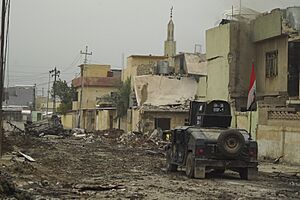War in Iraq (2013–2017) facts for kids
Quick facts for kids War in Iraq (2013–2017) |
|||||||
|---|---|---|---|---|---|---|---|
| Part of the Iraqi conflict, the war on terror, spillover of the Syrian civil war and the war against the Islamic State | |||||||
 Iraqi Special Operations Forces (ISOF) Humvee on the street of Mosul, Northern Iraq, 16 November 2016 during the Battle of Mosul |
|||||||
|
|||||||
| Main belligerents | |||||||
Allied groups:
|
|
||||||
| Commanders and leaders | |||||||
|
|
|||||||
| Units involved | |||||||
| See order | See order | ||||||
| Strength | |||||||
|
Awakening Council militias: 30,000
|
|
||||||
| Casualties and losses | |||||||
|
Liwa Zainebiyoun:
|
|||||||
| 67,376 civilians killed (Iraq body count figures) 5,625,024 displaced (IOM Iraq figures) Total killed: 217,500+ |
|||||||
The War in Iraq (2013–2017) was a big fight in Iraq. It was between the country of Iraq and its friends, and a group called the Islamic State (also known as ISIL).
Contents
Who Fought in the War?
Many different groups fought in this war. On one side were the Iraqi Armed Forces, the Kurdish Peshmerga, and other local groups. These included Turkmen, Assyrian Christians, Yazidis, Shabaki, and Armenian Christians. They were all fighting against the Islamic State of Iraq and the Levant.
Even though some Kurdish fighters worked with the Iraqi Army, most of them fought under their own leaders. This happened in the Kurdish region of Iraq.
How the War Started and Ended
The fighting in Iraq became much worse in December 2013. This happened after clashes in cities like Ramadi and Fallujah in western Iraq.
The Rise of the Islamic State
In June 2014, the Islamic State launched a big attack into Iraq. They took control of important cities like Mosul and Tikrit. After Mosul fell, the Prime Minister of Iraq, Nuri al-Maliki, wanted to declare a national emergency. However, Iraq's parliament did not agree. Many lawmakers did not want the Prime Minister to have more power.
At its strongest point, ISIL controlled a huge area of Iraq. This area was about 56,000 square kilometers and had 4.5 million people living in it.
International Help and Victory
The war led to Prime Minister al-Maliki stepping down in 2014. The United States and many other countries then started helping Iraq. They launched airstrikes to support the Iraqi military. American and Canadian special forces also helped with fighting on the ground.
The U.S. also started a program to rearm and train Iraqi soldiers and police. Around 200,000 Iraqi soldiers and police were trained. Iran also sent its military to help Iraq. Russia provided military and other aid.
On December 9, 2017, Prime Minister Haider al-Abadi announced that Iraq had won the war against the Islamic State. After this, the Islamic State changed its fighting style. They started using "hit and run" attacks to try and weaken the Iraqi government.
Some people in Iraq believe this war was connected to the Syrian Civil War happening nearby. Others think it was mainly caused by long-standing local problems in Iraq. These problems were made worse by the Iraq War (2003–2011) and later issues under Prime Minister al-Maliki.
Impact on People
The war had a very sad impact on many people. Between January 2014 and October 2015, nearly 19,000 regular people were killed in violence linked to ISIL.
The Islamic State also carried out terrible acts against certain groups. For example, they targeted the Yazidi people. This led to many Yazidis being forced to leave their homes in northern Iraq.
Images for kids
-
ISIL territory (red) in Iraq and Syria by mid-2014
-
Captured ISIL militant is guarded by PMF fighters after counter-insurgency operations in Saladin Governorate, April 2015
See also
- Casualties of the Iraqi insurgency (2011–present)
- American-led intervention in Iraq
- Iranian-led intervention in Iraq
- Military intervention against ISIL
- Ghost soldiers
- Falcons (anti-terrorism unit)
- Blowback (intelligence)
- Syrian Civil War
- 2014 Sinjar offensive
- Sinjar massacre
- Yazidi genocide
- Battle for Mosul Dam
- Operation Shader
- Opération Chammal
- Use of chemical weapons in the Iraqi Civil War
 | Victor J. Glover |
 | Yvonne Cagle |
 | Jeanette Epps |
 | Bernard A. Harris Jr. |




